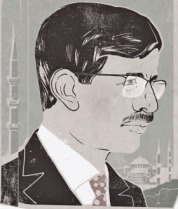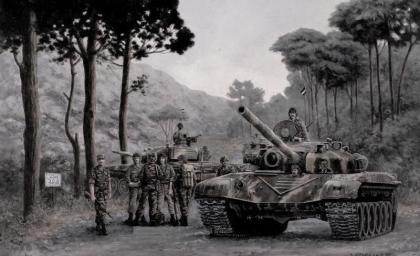The Problem With “Zero Problem Neighborhood”
While changes began in the foreign policy domain right from the onset of Prime Minister Recep Tayyip Erdoğan’s government, it was only in his second term and after the nomination of Ahmet Davutoğlu that Turkey’s foreign policy acquired a more “independent” flavor. Until now, Davutoğlu has been lauded for his “zero problem neighborhood” vision but as things stand today, there seems to be little merit for that praise.
Foreign affairs is one of those portfolios with peculiar pros and cons: there can be plenty of popularity gains for a foreign minister, who gets to socialize with international leaders and opinion makers, but there is also the inherent uncertainty of securing results as diplomacy depends on at least two interlocutors and the government he belongs to is but one of them.
That said, it is one thing for a particular diplomatic initiative to founder into political oblivion, it is another altogether to turn a would be close ally into a soon to be mortal enemy as was the case recently in Turkish-Syrian relations.
No one expected diplomats or politicians to predict the Arab spring but when dealing with an authoritarian regime, a crackdown on a potential uprising is a policy option implied in any dictator’s job description. Yet Turkey backtracked in its relations with Damascus.
Before Syria though there was Libya, where Turkey had also attempted to improve relations.
Here Ankara secured several profitable contracts for Turkish companies and Turkish diplomats hoped Libya would become—through the brother leader’s petrodollar sponsored political and charity ties below the Sahara—Turkey’s gateway to Africa.
Erdoğan, the humanitarian who now lectures Bashar al-Assad and Benjamin Netanyahu on human rights, had little compunction in accepting in 2010 the “Muammar Gaddafi Human Rights Award”—which he refused to return even after the Libyan revolt.
Confronted with Libya’s uprising, Turkey’s diplomacy failed to react, resigning itself to merely observing Western powers—from whom it had sought equidistance—breed a rebellion that would destroy the regime Turkey had so patiently cultivated
What could Ankara say? That Turkey had economic interests it wished to safeguard? Surely not as Turkey was then an adamant proponent of human rights after chastising Israel for its treatment of Palestinians in the wake of the Gaza flotilla incident. It couldn’t possibly now adopt a pragmatic speech favoring a dictator who referred to his own people as “rats.”
There was also the attempt at multilateral diplomacy in the United Nations Security Council earlier last year, where Turkey teamed up with Brazil to promote an alternate compromise between Iran and the West concerning the former’s nuclear program.
This too failed and Turkey, whose diplomats were rumored to be seeking to include Ankara in a potential Security Council permanent members expansion, was humiliated on the international stage. Both Iran and the West hardened their respective positions and ignored Turkey.
The very Iran that Davutoğlu and Erdoğan had wooed, by remaining largely silent during the Green movement’s protests against the ayatollahs, by promoting bilateral trade while the West embargoed and by engaging Islamist movements such as Hamas, rewarded Turkey’s “friendship” by supporting Syria’s crackdown, in defiance of the Turkish Government’s appeals for reform, and by promoting in Iraq a government headed by the Shī’ah Nouri Al-Maliki against Ankara’s preferred Sunni candidate Ayad Allawi.
Maliki is another problem as Iraq has been publicly supportive of Assad and was even touted to mediate between Syria and the West. Iraq, a country until recently half occupied by American troops and Iranian agents; a country just barely rebuilding its economic infrastructure, is now apparently more influential in the Middle East than Turkey.
Still, the Middle East is a tough neighborhood and surely Ankara’s goodwill would have paid off in less tumultuous surroundings. If it did though, it was not in Europe in spite of the fact that Davutoğlu has travelled extensively and worked tirelessly to bring to fruition his new foreign policy vision.
Apart from the all but suspended—courtesy of France and Germany—accession bid to the European Union, Ahmet Davutoğlu enacted a “football diplomacy” with Armenia to mend ties and ease tensions, visited Greece offering to delay Turkey’s pursuit of Greek debt as a good faith gesture and developed links with the Russian defense and energy industries.
Of course what was gained with Russia was disparaged when Turkey decided to hold military exercises with China outside of the Shanghai Cooperation Organization’s purview, sidelining Moscow, and more recently by seeking to isolate Syria against Russia’s wishes.
Relations with Armenia have gone nowhere largely because of the same old obstacles which had prevented it before—the unwillingness to recognize the Armenian genocide and Turkey’s preference for its fellow Turkic Azeris in any conflict over Nagorno-Karabakh.
Finally, Greece has shown its appreciation for Turkish openings by continuing to support Greek Cyprus in its political and energetic disputes with Turkey and by moving quickly to sign mutual defense guarantees with Israel following the Israeli-Turkish rift.
Bad blood between Tel Aviv and Ankara is also not entirely one sided in blame. The Israeli commandos did lose their cool on board the Mavi Marmara (right) but Erdoğan milked the media outrage over the flotilla deaths as much as he could and moved quickly to identify Israel as a “regional threat”—hardly the actions of an ally and far from the proper reaction to what was always described as a “diplomatic incident.”
board the Mavi Marmara (right) but Erdoğan milked the media outrage over the flotilla deaths as much as he could and moved quickly to identify Israel as a “regional threat”—hardly the actions of an ally and far from the proper reaction to what was always described as a “diplomatic incident.”
One should, on the other hand, not assign the onus for strained American-Turkish relations to the AKP Government. The United States Congress’ recognition of the Armenian genocide and the Bush Administration’s failure to curb the activities of Kurdish militants in Iraqi Kurdistan were what caused the strain. But if anyone deserves credit for repairing them, that someone is President Barack Obama, who made Turkey a personal priority, not Prime Minister Erdoğan.
When confronted by such principles as national interest and balance of power being applied by its interlocutors, Turkey’s “zero problem neighborhood” doctrine has been found wanting. Time now for some reflection on the part of Ankara’s leadership and those who made its case.
(Originally published in the Atlantic Sentinel)


